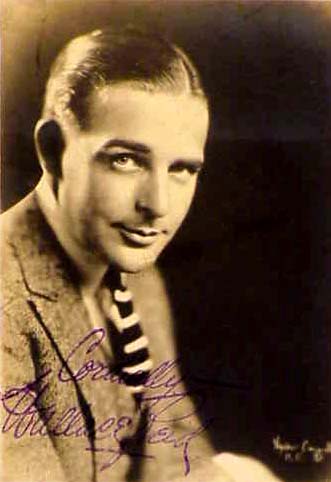 Wallace Reid
Wallace Reid was born April 15, 1891, into a theatrical
family. His mother was a leading lady, and his father was an actor,
playwright and later director and actor in films. He went to pre-med
school and served as a reporter and a surveyor, but decided he
would be happier acting. He began on the stage, with the help
of his father, but by 1910, he began his film career with Selig
and made over 100 short for Selig, Vitagraph, Reliance, Universal
and others. In addition to acting, he worked as a cameraman and
writer. While making the 1912 short "His Only Son" for
Reliance, he met Dorothy Davenport, and they were married the
following year. Although he made other films of note, his appearance
as the muscular blacksmith in D.W. Griffith's "The Birth
of a Nation" (1915) also brought him notice. In mid-1915,
he signed a contract with Paramount and stayed with this company
for the rest of his career. His fame was cemented with he co-starred
with Geraldine Farrar in "Carmen" (1915) and "Joan
the Woman" (1917). Reid made the first of his racing films
in 1919, entitled "The
Roaring Road." After that, he was most readily identified
with this type of entertainment making several others such as
"Double Speed," "Excuse My Dust" and "What's
Your Hurry?" He made other types of films, too, with some
of the major female stars of the period including Ann Little,
Anna Q. Nilsson, Bebe Daniels and Agnes Ayres. He starred in two
of Cecil B. DeMille's "bedroom" pictures opposite Gloria
Swanson, "The Affairs
of Anatol" (1921) and "Don't Tell Everything"
(1921). Reid had made 32 features for Paramount when he was selected
to star in a lumbercamp story "The Valley of the Giants"
in 1919. The film was being made in the High Sierras, and the
train carrying the company on location was involved in a wreck
which badly injured Reid. Reportedly, Reid was supplied morphine
for his pain, to which he eventually became addicted. He made
23 more films without fan realizing there was a problem. However,
those who worked with him on his last film, "Thirty Days"
(1922), claim his condition was very poor. As soon as the picture
was finished, he checked into a sanitarium but died Jan. 28, 1923.
His death came as a shock to fans because Reid was apparently
the epitome of the happy family man, very athletic, able to play
several instruments and very well-read. His wife made the anti-drug
film "Human Wreckage" in 1923, and a few other social
conscious films continuing as a producer, writer and director
for many years. She died in 1977, having never remarried.
Selected films of this star available for viewing:
Carmen (1915)
The Golden
Chance (1916)
Intolerance (1916)
Joan the Woman (1916)
Hawthorne of the U.S.A. (1919)
The Roaring
Road (1919)
Excuse My Dust (1920)
The Affairs
of Anatol (1921)
Wallace Reid
Wallace Reid was born April 15, 1891, into a theatrical
family. His mother was a leading lady, and his father was an actor,
playwright and later director and actor in films. He went to pre-med
school and served as a reporter and a surveyor, but decided he
would be happier acting. He began on the stage, with the help
of his father, but by 1910, he began his film career with Selig
and made over 100 short for Selig, Vitagraph, Reliance, Universal
and others. In addition to acting, he worked as a cameraman and
writer. While making the 1912 short "His Only Son" for
Reliance, he met Dorothy Davenport, and they were married the
following year. Although he made other films of note, his appearance
as the muscular blacksmith in D.W. Griffith's "The Birth
of a Nation" (1915) also brought him notice. In mid-1915,
he signed a contract with Paramount and stayed with this company
for the rest of his career. His fame was cemented with he co-starred
with Geraldine Farrar in "Carmen" (1915) and "Joan
the Woman" (1917). Reid made the first of his racing films
in 1919, entitled "The
Roaring Road." After that, he was most readily identified
with this type of entertainment making several others such as
"Double Speed," "Excuse My Dust" and "What's
Your Hurry?" He made other types of films, too, with some
of the major female stars of the period including Ann Little,
Anna Q. Nilsson, Bebe Daniels and Agnes Ayres. He starred in two
of Cecil B. DeMille's "bedroom" pictures opposite Gloria
Swanson, "The Affairs
of Anatol" (1921) and "Don't Tell Everything"
(1921). Reid had made 32 features for Paramount when he was selected
to star in a lumbercamp story "The Valley of the Giants"
in 1919. The film was being made in the High Sierras, and the
train carrying the company on location was involved in a wreck
which badly injured Reid. Reportedly, Reid was supplied morphine
for his pain, to which he eventually became addicted. He made
23 more films without fan realizing there was a problem. However,
those who worked with him on his last film, "Thirty Days"
(1922), claim his condition was very poor. As soon as the picture
was finished, he checked into a sanitarium but died Jan. 28, 1923.
His death came as a shock to fans because Reid was apparently
the epitome of the happy family man, very athletic, able to play
several instruments and very well-read. His wife made the anti-drug
film "Human Wreckage" in 1923, and a few other social
conscious films continuing as a producer, writer and director
for many years. She died in 1977, having never remarried.
Selected films of this star available for viewing:
Carmen (1915)
The Golden
Chance (1916)
Intolerance (1916)
Joan the Woman (1916)
Hawthorne of the U.S.A. (1919)
The Roaring
Road (1919)
Excuse My Dust (1920)
The Affairs
of Anatol (1921)
Return to photos page

